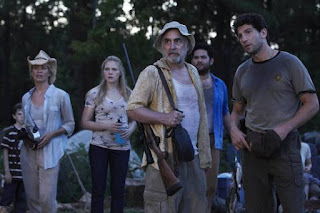Walking Despair

“There is no hope and you know it now!” — Herschel, "The Walking Dead."
If I had to choose between zombies and vampires — and I mean this for multimedia purposes — I would choose zombies. It's fair to say that "Twilight" forever ruined vampires. Meanwhile, zombie movies and shows seem to provide fodder for action, comedy, drama, and musings on the importance of hope.
It's the latter that has become an interesting focus for "The Walking Dead," the AMC show based on a graphic novel. The stated purpose of the graphic novel, and hence the show, is to examine what happens in the zombie movie after the closing credits — after the main characters survive an epic showdown and are forced to live in the ruined zombie world. You know, the less fun part that would have happened after the zombie clown showdown in "Zombieland."
That sort of intrigues me. When we did the End Times class last summer, one of the cultural theories of the end of the world we talked about was the zombie scenario. Often its a virus that destroys most of humanity, leaving people hulking, soulless shells of what they used to be. It's a genre that really questions the soul. And what "The Walking Dead" has boiled down to is an exploration of the soul of those left trying to make sense of a now senseless, violent, and dangerous world.
And there we stumble upon something worthy of reflection. After months of battling and seeing members of the group fall, the core characters are running out of hope. All the supposed salvation sites have become mirages. What they're left with is an increasingly bleak landscape with few options. The question the characters seem to be wrestling with is how they can have the hope to move forward.
Hope is a core essential of humanity. The new take on Batman deals quite clearly with the idea of hope as being a core and sustaining principle. "Watchmen," a movie and graphic novel that is a philosophical fascination to me, depicts a world where hope is non-existent. It leaves you with a raw, unflattering look at humanity. And that's the struggle with "The Walking Dead." They want to have hope, but they can't seem to find it given the increasingly grim circumstances of their lives. And there is a reason for that — they don't know where to look.
There is another place that talks about the foundational importance of hope, and that is the Scriptures. 1 Corinthians 13:13 says, "And these three remain — faith, hope and love. And the greatest of these is love." Faith, hope, and love are the foundations of Christianity and of a fulfilled life. And these are the things we derive from our Savior. Which is what makes depictions on "The Walking Dead" fascinating and informative.
The creators clearly recognize hope as a sustaining force, but they don't know where real hope comes from. I would say that is true of non-believers. Thus, their hope is derived from rumored places of safe harbor, people who seem to have a plan, and the circumstances of their lives. They place hope in the temporal things of this world, and when those things fail, hope departs and despair takes its place.
When you place your hope in the temporal things of this world, you will always be disappointed. That is not a real hope. That is not a hope that can sustain you. That is my biggest problem with "The Dark Knight." It offers a message of false hope in the nobility of man. That is an illogical conclusion based on the sum total of human history and the incontrovertible truth of the Scriptures.
Without faith, we all walk in despair. When we put our faith in the solid rock of Jesus Christ, and our eternal salvation, we walk in the light of hope.



Comments
Post a Comment